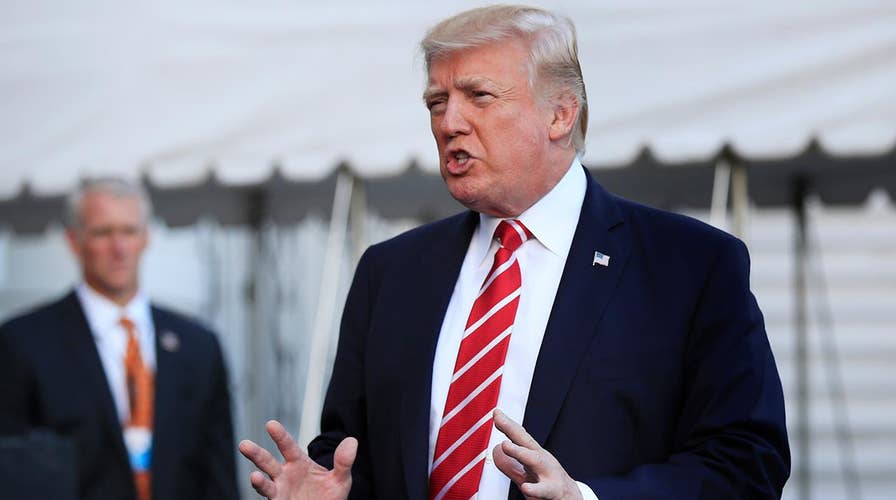President Trump says media needs him to be reelected
Trump tells the New York Times that 'all forms of media will tank' if he is not president; reaction and analysis from journalist Emily Shire and Fox News contributor Tammy Bruce.
Supporters say President Trump accomplished a great deal in his first year of office: helping to pass a massive tax overhaul, putting Neil Gorsuch on the court, snuffing out President Obama’s regulatory excesses, signaling a more robust foreign policy and damping illegal immigration, for starters.
It is also important to note what Trump didn’t do: he didn’t start World War III, he didn’t deport 11 million people in the country illegally, he didn’t eliminate guarantees of equal status for women, he did not toss the Iran nuclear deal, he did not fire Special Counsel Mueller or Attorney General Sessions, he didn’t cause the stock market to crash or upend our monetary policy, he failed to greenlight Putin’s mischief-making in Eastern Europe, he hasn’t reinstated the use of torture, and also hasn’t ignited a trade war. And, he didn’t plunge the country into recession.
Trump’s hysteria-prone critics, who repeatedly warned he was about to do all or any of the above, are no doubt gravely disappointed. But also unrepentant. Senate Minority Leader Chuck Schumer and House Minority Leader Nancy Pelosi continue to sound grave warnings, hinting that Trump’s dangerous policies are leading the ship of state aground. The GOP tax policy is Armageddon, said Pelosi, and Schumer said it would “skewer” the middle class. Other Democrats have insisted that axing ObamaCare’s individual mandate “kicks 13 million people off” health care insurance.
The mainstream media has played nicely with Democrats all year, repeating their preposterous claims. And yet, Americans have greater confidence in their circumstances than at any time in the past 17 years. The recent tick lower in consumer sentiment came while Democrats sounded apocalyptic warnings about the tax rewrite; no surprise that some people were a bit shaken.
A realistic assessment of Trump’s first year would note a transition to a smoother and more disciplined White House, better coordination with Congressional allies and a more integrated messaging on foreign policy.
But the country remains more upbeat than they did during the Obama years, tuning out the most ominous warnings from the Left. Good for them, because some of the predictions were downright scary.
The night Trump trounced Hillary Clinton, Paul Krugman predicted the stock market, which initially sold off on the unexpected outcome, would “never” recover from the blow. The next day, the Dow soared 257 points, and has barely paused for breath ever since. In the same column, written in the wee hours of Election night, a despondent Krugman said Trump would plunge the country into a terrible recession.
Paul Krugman followed that mistaken call with dire warnings about everything Trump for the past year. Among other alarums, he warned that the president would recklessly choose a partisan hack to fill Janet Yellen’s shoes – “Trumpifying the Fed” --as he described it. How disappointed he must have been when the White House picked mainstream Fed board member Jay Powell to fill the role.
Krugman has had plenty of company conjuring up frightening visions of our Trumpian future. Columnist David Brooks, who fancies himself a moderate, said Trump would “probably resign or be impeached within a year.”
The New Yorker’s David Remnick, wrote a piece the day after the election entitled An American Tragedy. Remnick saw End of Days horrors spilling out from the Trump presidency, calling the election “a sickening event in the history of the United States and liberal democracy.” That the country elected Trump as a Democratic exercise was apparently immaterial to Remnick. The New Yorker editor said Trump would “not only set markets tumbling but will strike fear into the hearts of the vulnerable…”
Critics of the president might argue that Trump himself has brought on some of the concerns, by campaigning on stark promises to “tear up” the Iran deal or deport undocumented people. The president took strong stances during the election, as does every candidate (did we really think Bernie would make colleges free for all?) and has certainly shaken up establishment thinking on a variety of fronts, including our relationship with NATO, the UN and respect for the Iran deal.
Moreover, the president surprised many by following through on his threat to withdraw from the TPP trade deal (a promise also made by Hillary Clinton), his disavowal of the Paris climate accord and, most recently, by declaring Jerusalem the capital of Israel. There is nothing incoherent or reckless in these decisions however; they are compatible with Trump’s focus on jobs, and applauded by his supporters. While 66 percent of Democrats worry about climate change “a great deal”, for example, only 18 percent of Republicans are so concerned. Trump voters, like the president, see the Paris deal as bad for our economy.
A realistic assessment of Trump’s first year would note a transition to a smoother and more disciplined White House, better coordination with Congressional allies and a more integrated messaging on foreign policy. Soon, people may start to talk of a learning curve, and credit neophyte Trump with a better appreciation of what it takes to be a successful president.
That will be bad news for his opponents. He does, after all, like to win.
As we move into 2018, Democrats will hope that talk of impeachment motivates their supporters to take back control of the House. They will try to scare Americans with continued visions of gloom and doom. If the economy continues its steady climb, wages move higher (as is almost certain), and the stock market follows suit, they will need new talking points. Judging from surveys of consumer and business sentiment, Americans do not think the world is coming to an end.





















